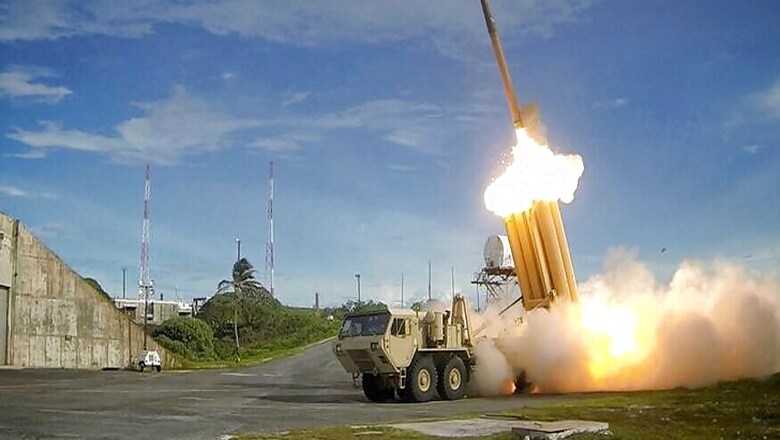
views
Washington: North Korea on Sunday said its latest ICBM launch was a "warning" over efforts to slap sanctions on the hermit state, as the US carried out a successful test of its missile defense system in a pointed show of force.
A bilateral mission led by US strategic bombers on Sunday flew over the Korean Peninsula in a direct response to the North's launch of an intercontinental ballistic missile it boasted could reach the United States.
The exercise was followed Sunday by a successful test by American forces of a missile interception system the US hopes will be installed on the Korean peninsula.
North Korean leader Kim Jong-Un boasted of his country's ability to strike any target in the US after the ICBM test Friday that weapons experts said could even bring New York into range -- in a major challenge to Trump.
Under Kim's leadership, North Korea has accelerated its drive towards a credible nuclear strike capability, in defiance of international condemnation and multiple sets of UN sanctions. The US Senate passed new bipartisan sanctions on Pyongyang on Friday.
But the US-led campaign only provided "further justification" for the North's resolve to maintain its weapons programs, Pyongyang's foreign ministry said in a statement carried by the official Korean Central News Agency (KCNA).
"The... test-fire of ICBM ... this time is meant to send a stern warning to the U.S. making senseless remarks, being lost to reason in the frantic sanctions and pressure campaign against the DPRK," it said, using an acronym for the North's official name.
The statement came hours after US President Donald Trump warned that he would not allow China -- the impoverished North's sole major ally and economic lifeline -- to "do nothing" about North Korea.
In his critique of Beijing, which came in two tweets, Trump linked trade strains with the Asian giant -- marked by a trade deficit of $309 billion last year -- to policy on North Korea, after South Korea indicated it was speeding up the deployment of a US missile defense system that has infuriated China.
"I am very disappointed in China. Our foolish past leaders have allowed them to make hundreds of billions of dollars a year in trade, yet they do NOTHING for us with North Korea, just talk," Trump wrote.
"We will no longer allow this to continue. China could easily solve this problem!" Trump, who is at loggerheads with Beijing over how to handle Kim's regime, has repeatedly urged China to rein in its recalcitrant neighbor, but Beijing insists dialogue is the only practical way forward.
US Ambassador to the UN Nikki Haley tweeted that she was "done talking" about North Korea. "China is aware they must act. Japan & SKorea must inc pressure. Not only a US problem," she said.
Trump's tweets coincided with a 10-hour bilateral mission that saw US B-1B bombers along with fighter jets from the South Korean and Japanese air forces practice intercept and formation drills.
It was followed by the successful test of the missile defense system, with the launch of a medium-range missile over the Pacific that was "detected, tracked and intercepted" in Alaska.
"North Korea remains the most urgent threat to regional stability," said General Terrence O' Shaughnessy, Pacific Air Forces commander, in a statement.
"If called upon, we are ready to respond with rapid, lethal, and overwhelming force at a time and place of our choosing."
Japanese Foreign Minister Fumio Kishida said he held telephone talks with US Secretary of State Rex Tillerson and agreed on the need to put "the heaviest possible pressure" on North Korea.
"We confirmed that we will closely cooperate in adopting a fresh UNSC (UN Security Council) resolution, including severe measures, and working on China and Russia," Kishida told reporters.
In a standard response to the test, Beijing urged restraint by all sides, after the US and South Korea conducted a live-fire exercise using surface-to-surface missiles.
The heads of the US and South Korean militaries also discussed "military response options" after North Korea's launch, the Pentagon said.
The US military will also roll out "strategic assets" to the South following the North's missile test late Friday, according to South Korean defense minister Song Young-Moo. Song declined to specify the nature of the mobilization, but the phrase usually refers to high-profile weapons systems, such as stealth bombers and aircraft carriers.




















Comments
0 comment